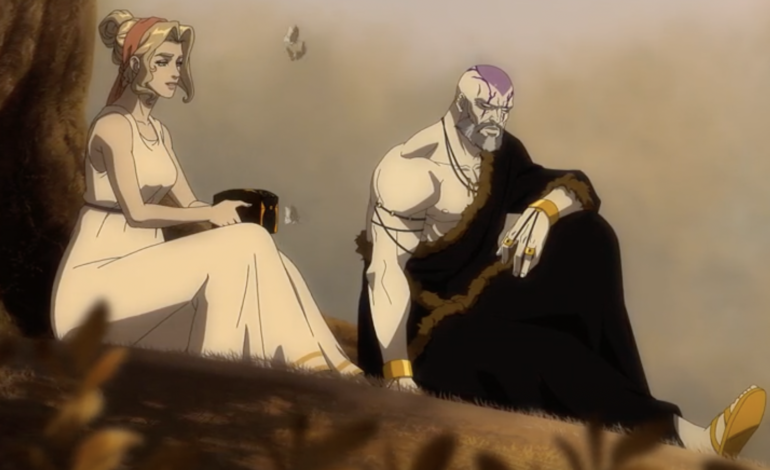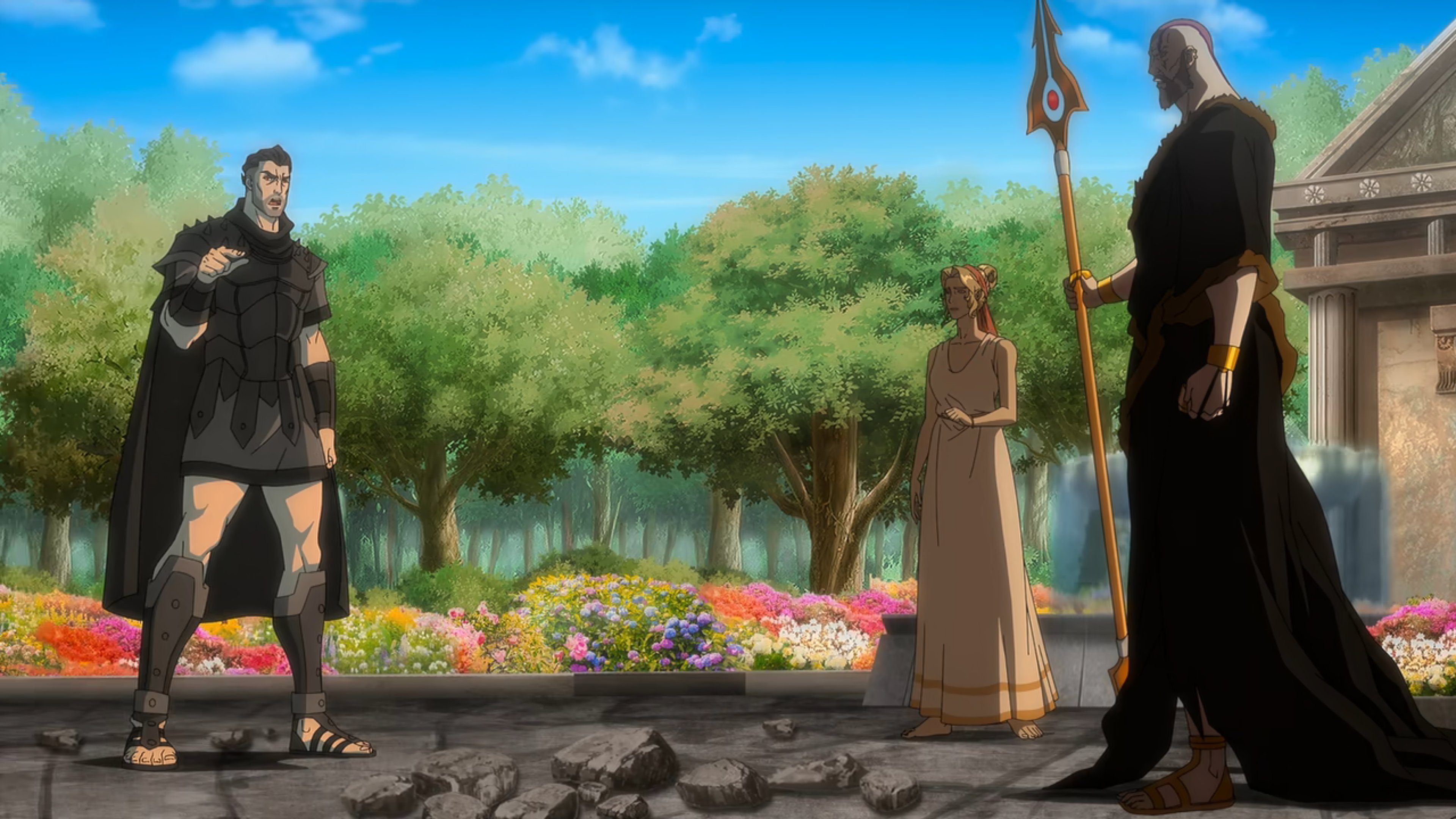

Season 2, Episode 3 of the Netflix series Blood of Zeus, titled “Winter is Born,” is directed by Jae H. Kim and Jae Woo Kim and penned by the show’s creators, Charles Parlapanides and Vlas Parlapanides. The story reveals the backstory of Hades (Fred Tatasciore) and Seraphim’s (Elias Toufexis) love lives. Hades tells Seraphim the true account of how he met Persephone (Lara Pulver), though it should be noted that this is only true in the Blood of Zeus universe and is unconfirmed or false in actual Greek mythology. Hades does this to create a bond between himself and Seraphim, hoping to convince the demon to side with the Lord of the Underworld before the competition for the Eleusinian Stone.


Hades and Persephone
In the past, Persephone, daughter of Zeus, aided her mother, Demeter (Cissy Jones), in tending to nature and the environment across Greece. This allowed the country, and likely the world, to experience an eternity of spring and summer, aiding the mortals in growing abundant food and living peaceful lives. Despite this, Demeter wanted her daughter to marry and believed Ares (Matt Lowe) was a suitable match before his romantic involvement with Aphrodite. This suggests that this flashback takes place before Aphrodite’s arrival to Olympus and her forced marriage to Hephaestus (Adam Croasdell). Persephone does not like Ares because of his violent nature.
However, Persephone found a suitable suitor in her uncle Hades. Hades was kind, gentle, and always treated Persephone well. The relationship began when Hades gave Persephone a potion that helped save one of her horses as it was dying in pain. From this point on, they would spend time daily in Persephone’s garden tending to her plants and horses. As their trust and love for each other grew, Hades would at times disclose his terrible life ruling the Underworld, which he also does with Seraphim when recounting his love life in the present day. It was not just difficult; it was tormenting from the beginning of Hades’ rule.


The Underworld’s Torment
Hades became the ruler of the Underworld the moment he picked the red stone, which the Olympians set up as a gamble to see who would rule Mount Olympus, the seas, or the Underworld. Zeus and Hera cheated, while Poseidon went along with the manipulation out of fear of Hera, leaving Hades unaware of the deception. Hades was enraged when he learned the truth, but he decided not to retaliate, likely out of love and loyalty for his family. He reigned over the Underworld as expected, but the screams, pain, and suffering of the guilty and innocent, specifically those who did not accept death or became wandering wraiths, had a negative effect on Hades. His skin turned pale, he lost all his hair, and he aged into somewhat of a tough fifty-year-old man.
Hades couldn’t handle it anymore, so he left the Underworld from time to time. The problem with leaving the Underworld is the bond Hades has to it. He cannot leave his realm for very long, or he will experience a level of suffering and pain similar to a vampire under the sun. Hades has to return to the Underworld repeatedly to rule as a lonely god, but everything changed when he met Persephone. He was happy and grateful for all the time he spent with her in her garden discussing their backgrounds, likes (value for life), and similarities.


Ares vs. Hades
During one of Hades and Persephone’s dates, Persephone was confronted by Ares, who demanded his sister be his wife. The daughter of Demeter refused, and the conflict escalated into a duel between the embodiment of war and nature. The embodiment of death, Hades, interfered and scolded his nephew for his inappropriate, arrogant, and abusive attitude. Although most fans would disagree with how Ares is portrayed, there is a likelihood that this Ares in the flashback is not the same as the one in the present day. The present-day Ares is ruthless and hateful towards Zeus’ bastards, like Heron (Derek Phillips), but he can be honorable and respectful at times. He even sired the queen of the Amazons, Queen Hippolyta, and has a strong respect for women. The flashback might depict a hot-headed Ares who had not yet become the “honorable” god he is today. If people can change, then gods can change too. Life is not stagnant.


Persephone’s Choice
Following the conflict, Persephone decides to become Hades’ wife and Queen of the Underworld. The love between the two is so strong that Persephone rarely returns to the surface, which worries her mother Demeter, who tracks her daughter to the Underworld. Demeter disapproves of Persephone’s relationship with Hades because the realm of death is the opposite of life and nature, arguing that Persephone, like a flower, will wither and die in the realm. Demeter is not wrong, as Hades suffered in his realm and is no longer the god he once was before the beginning of his reign. Also, Persephone in the present day has become pale like her husband. Nevertheless, Persephone accepted the risk and consumed six pomegranate seeds in defiance. Eating the pomegranate seeds binds Persephone to the Underworld like Hades, and she cannot prolong her stay on the surface of the world as she used to.
Demeter became furious and confronted Zeus about their daughter’s predicament. To avoid any war and conflict, Zeus dictates that based on the six pomegranate seeds Persephone consumed, she will have to stay with Demeter for the first six months of the year (spring and summer) while the remaining months (autumn and winter) she can live with her husband Hades. For this reason, Demeter will always be miserable during the last six months of the year, allowing winter to come and overtake Greece and the world until Persephone returns to her at the beginning of a new year.
Demeter’s action is selfish as she would condemn the mortals of the world to an eternity of facing countless winters, famines, and starvation just because she couldn’t live without her daughter for half a year. This shows the cruelty of the Goddess of the Harvest and the irresponsibility of Zeus for not defending his daughter’s love for Hades and not convincing his sister to continue aiding nature to prevent winter from returning. Persephone is the blood of Zeus, yet her life became difficult because of her parents’ decision to separate her from Hades and later her two children for the first six months of her life.


Gorgo is a Wraith
Seraphim sympathizes with Hades’ predicament as the God of the Underworld continues to compare his past love life with Seraphim’s. Seraphim loved Gorgo but left her to continue his vengeance against the noble who killed his foster mother, Ariana, which resulted in Seraphim’s escape to the cave and eating the giant’s flesh to survive as a demon. Hades criticized Seraphim’s decision to choose vengeance over love and showed him the consequence: Gorgo died without Seraphim’s protection and became a wraith. Wraiths are ghosts who are not given proper funeral rites, which involve placing two coins, one for each eye of the corpse, so the deceased can pay Charon for their passage to the Underworld via the River Styx. Gorgo was not given the proper rites because her corpse was not found by her fellow priestesses.
Due to this, Seraphim fell into regret and finally decided to aid Hades’ cause in getting the Eleusinian Stone in exchange for Gorgo’s passage into the Underworld and giving her the waters of Lethe so she can forget the painful experience of her death and her time as a wraith. Although Hades is sympathetic, it is worth noting that the wraiths are also partly Hades’ fault. He should have enough coins in the Underworld to pay for each and every wraith’s departure to the Underworld, evident by how he helped Seraphim find passage by giving the latter’s corpse the two coins needed to do so through proper funeral rites. In other words, Hades is selfishly using a suffering wraith, or to be specific a deceased mortal who is suffering, to get what he wants. Hades is no different than Zeus, albeit more responsible and logical than his younger brother and former king.


The Subjects of Zeus
Back in Olympus, Heron is aided by Hephaestus in his quest to find the Adamantium Sword Zeus left for him. The God of Smiths gives Heron a compass that can guide him if he places a piece of adamantine in it, the same material the sword is made of. After that, the compass will guide Heron to the desired artifact or weapon made from the adamantine: the Adamantium Sword.
Soon, a large crowd of mortals, demigods, creatures, and monsters arrives at Mount Olympus. They are Zeus’ subjects and the people he looked after or threatened during his reign. Half came to pay their respects to the deceased King of Olympus, Zeus. The other half came to confirm Zeus’ thunderous demise. Hephaestus comments on these suspicions while Apollo (Adam Croasdell), who is overseeing the crowd’s arrival, states that Zeus was complicated and flawed like any person or god, but he was mostly known to be feared. The fear of Zeus’ wrath is what kept every mortal, monster, and creature in line and prevented them from debasing their primal nature.
Although Zeus is dead, he will be judged like every mortal either to be imprisoned in Tartarus or rest in the fields of Elysium, with the former being most likely. However, an immortal’s death is different from that of a mortal. While mortals can spend eternity in the Underworld, either in Elysium or Tartarus, without conflict, immortals can gradually fade into nothingness if everyone in the mortal plane, everyone who is still living, forgets them. For this reason, Apollo plans to have every temple across Greece, and likely the world, remember Zeus and his various deeds: the good and the bad. Hephaestus agrees with this endeavor, but Heron is still conflicted, which is why he has nothing to say on the matter. Overall, the episode does well in exploring Hades and Seraphim as individual characters. Heron is practically a side character at this point, with only the supporting characters on his side doing most of the talking and decision-making.
Rating: 9/10

